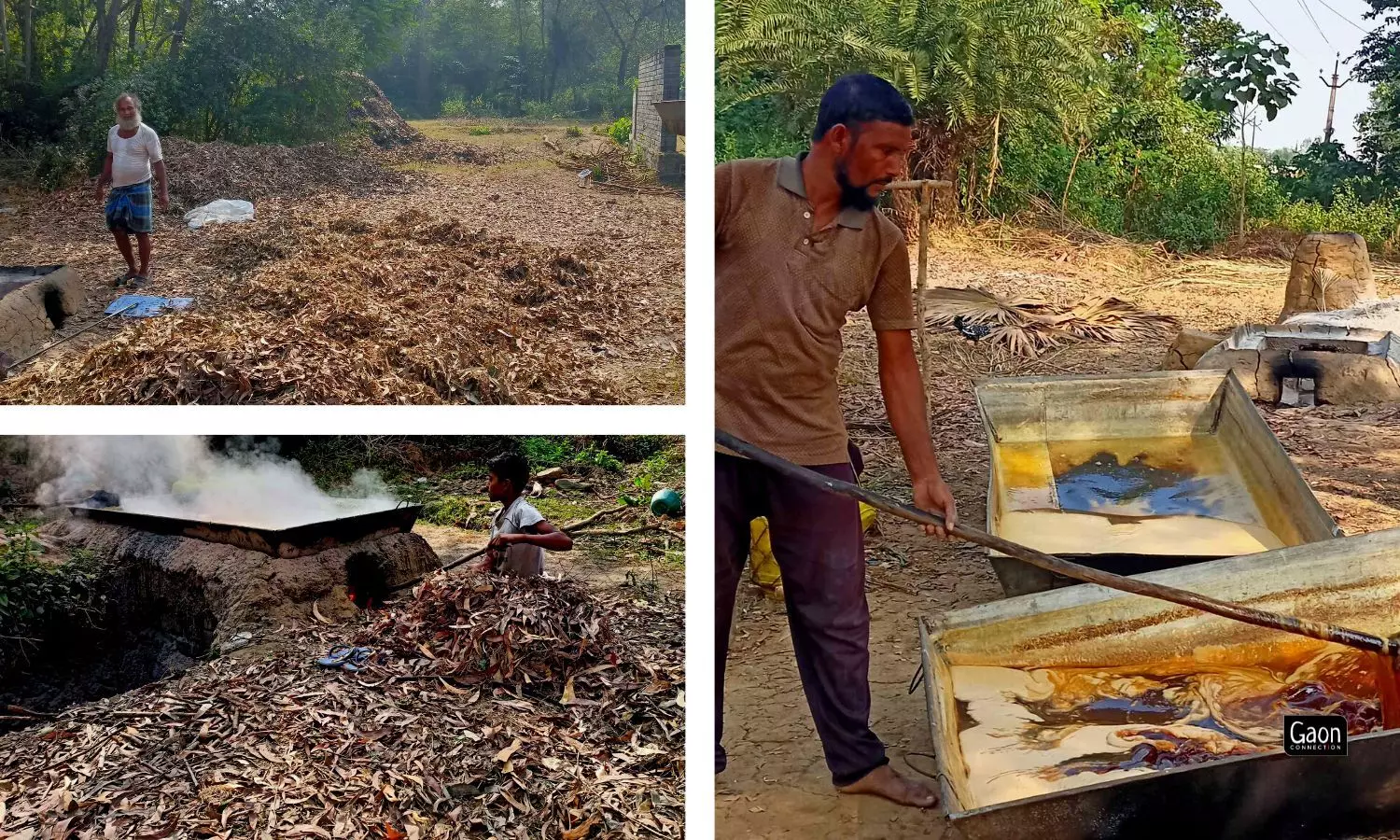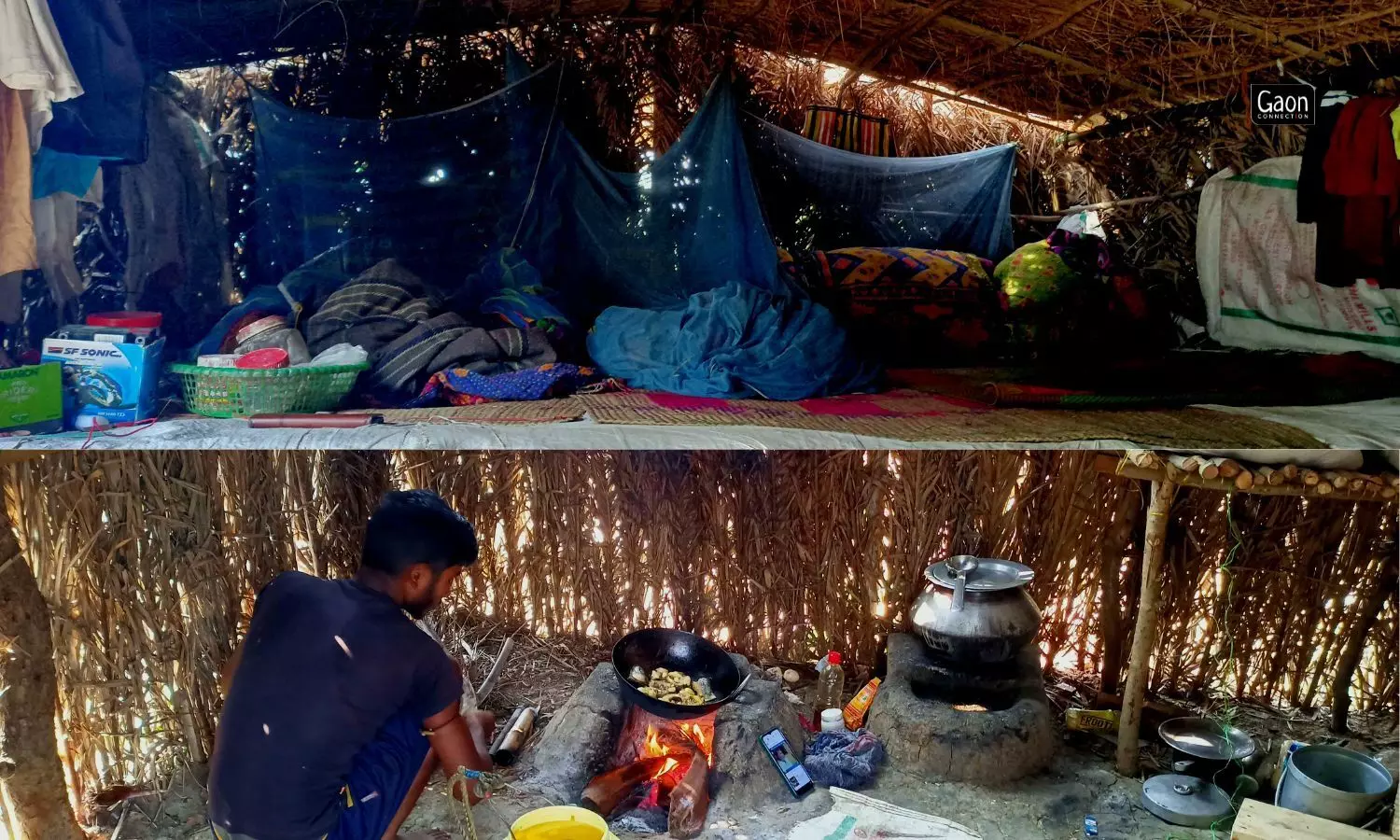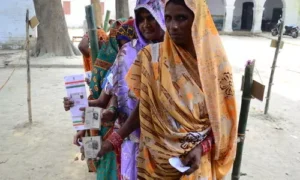Lokepur Village (Bankura), West Bengal
While the rest of the village of Lokepur in Bankura, sleeps on the winter nights, wrapped up in blankets, Khurshid Aalam, Soyed Aali Mondal and Ibrahim Mallik, make their sleepy way towards the date trees on the edge of the forest.
They have to reclaim the pot of juice before it ferments and turn it into the delicious date palm jaggery, a winter delicacy which helps them earn a living. It is locally known as patali gur.
In the dark of dawn with barely a hint of light in the skies to guide them, the men climb 20 feet or so up the dangerous date trees to bring down the juice pot. Each one climbs up and down at least 60 date trees each day.

There are nearly 2,000 mahols that can be spotted across villages of Bankura, Purulia, and Jhargram districts in West Bengal, where patali gur is made.
These men have travelled far from their villages in West Bengal to find and tap the date trees. Khurshid, his father Monsur Aali Bhunya and his nephew Mursalim Dalal have come to Lokepur from Gopinathpur village in Kotulpur block, about 70 kilometres away.
“In the middle of the month of Kartik in Bengal (first week of November), we leave home and move to remote villages. We find out where the date palm trees are and set up camp near them somewhere,” 45- year-old Khurshid Aalam told Gaon Connection.
A verbal contract is made with the landowner where the date palm trees stand. The jaggery makers agree to give three kilograms of jaggery per tree to the landlord in the space of three months.
Also Read: A Date With Israel: Farmers in Jaisalmer experiment with dates
In addition, they have to pay a rent up to Rs 6,000 for the three months they will spend there collecting the date juice and making the jaggery at the mahol they have set up for that purpose. Mahol is a makeshift date palm jaggery manufacturing centre.
There are nearly 2,000 mahols that can be spotted across villages of Bankura, Purulia, and Jhargram districts in West Bengal, where patali gur is made. A majority of those who collect the date palm juice and make the jaggery are Muslims.
The jaggery makers come to their place of work in November and build themselves small thatched huts where they stay for the following three months. They try to locate these huts near national or state highways, so that jaggery traders can easily get to them. They finish what they set out to do by the end of February, and then they make their way back home.

The jaggery makers have to reclaim the pot of juice before it ferments and turn it into the delicious date palm jaggery.
“Our staying arrangements are very basic. We have emergency lights but that we use only during dinner. We charge them and our mobile phones in the homes of the local people in the villages where we stay,” said Ismail Mallik, a jaggery maker from Sunukpahari village.
There are usually three men to a mahol. And, they are mostly from the same family. But some others work as labourers for a daily wage of Rs 250 a day, said Ismail Mallik.
Date palm jaggery forms the economy of several villages in the region, as most of the traditional jaggery makers do not have a cultivable land of their own.
“There are about 300 families in our village. Of that there is this annual exodus of male members of about 250 of those families. They travel to different parts of Bankura, Purulia, and Jhargram districts to make date palm jaggery. Some even go to Chaibasa, Dhanbad, Jamshedpur, Chakradharpur in the neighbouring Jharkhand state,” 70-year-old Abdul Haque Mondal from Satsagra village in Indpur block, Bankura, told Gaon Connection.
Also Read: Sweet Tidings: The Journey From Sugarcane Fields to Traditional Jaggery-Making
Abdul Haque Mondal, his son Bakibul Mondal and son-in-law Aasadul Mondal travelled 60 kms to Manbazar village in Purulia district to make date palm jaggery.
“My father, grandfather made this jaggery. We have been doing this for generations. If we had an alternative way of earning, why would we have to go through so much painful work,” said Aakker Ali Mondal from Satsagra village, who had come to Poyabagan area near Bankura town to make date palm jaggery.
Explaining how patali gur is made, Sayed Aali Mondal said: “At first the date palm trees are cleaned by cutting withered leaves and branches. Then the upper part of the trees are scraped 9-10 inches vertically and left like that for seven days. Thereafter, a narrow wooden pipe is inserted at the scraped part and a plastic container is hung under it in which the juice falls.”
Timing of the entire princess is important. The date palm juice collects in the plastic containers hung on the trees at noon, and removed at dawn the following day. Each container holds up to five litres of juice, said Sayed Aali Mondal.
The juice is poured into a large container that is kept over a clay oven fired with dry leaves, and stirred constantly. It takes about six hours to make jaggery from juice, he added.
There is smoke, there is pollution but this is the only means of livelihood for the traditional jaggery makers of West Bengal.

The jaggery makers come to their place of work in November and build themselves small thatched huts where they stay for the following three months.
It takes about seven litres of juice to make one kg of jaggery. Each tree yields juice thrice a week. The plant is rested for the remaining four days, said jaggery-maker Sayed Aali Mondal.
There are usually 150-200 date palm trees near a mahol. As the winter progresses, more juice is available, and the jaggery tastes better.
Sayed Aali Mondal’s two sons — Aasif and Tariq — who are in the seventh and fifth standards respectively, also work at the mahol with their father in Jagdolla Sonamela village, near Bankura town. This is the way they learn their traditional work, said the father.
Balaram Modok and Ramgopal Mishra, the local jaggery traders, said that there is a huge demand for date palm jaggery. “We sell it at Rs 60 per kilo to the other neighbouring states,” Modok said.
According to him, the jaggery in its liquid form could be had at breakfast. “Consuming this jaggery would eliminate the need for multivitamins. It contains glucose, sucrose, and fructose, as well as a variety of nutrients,” he said.
Also Read: Gud news: Lucknow’s ‘Jaggery festival’ explores opportunities in agro-trade
Narayan Mondal, a resident of Sonamela village in Bankura, said that he buys patali gur directly from mahol. “This year, date palm jaggery is being sold at Rs 75 per kilogram in the open market. We buy from mahol at the rate of Rs 60.”

Date palm jaggery forms the economy of several villages in the region, as most of the traditional jaggery makers do not have a cultivable land of their own.
The wholesale rate of the jaggery is Rs 50 a kilogram. The jaggery sells well between mid-December and the end of January. A mahol earns about Rs 50,000 in this period, excluding their staying and food expenses.
AK Jha, additional district forest officer of Bankura North Division, said that the date palm trees are located at the outskirts of forest areas hence no permission is required from the forest department for the jaggery makers to continue their traditional occupation.




















